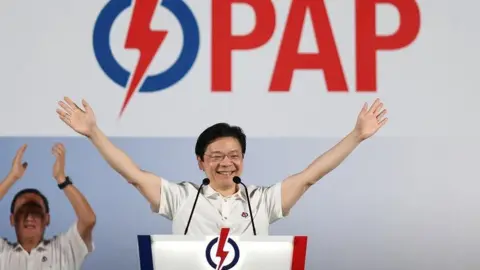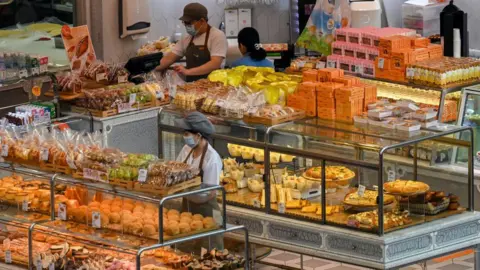 Ong Ye Kung/TikTok
Ong Ye Kung/TikTokThe TikTok video begins with Singapore’s health minister Ong Ye Kung smiling at the camera while sitting on a park bench.
“So no-one told you life was gonna be this way,” the instantly recognisable theme song to the sitcom Friends plays, as he’s suddenly joined by the other four members of his team running in the upcoming general election.
Cut to a snappy montage of them fist-bumping each other and mingling with residents at community events, as the song’s chorus delivers their political message: “I’ll be there for you”.
It’s one of the many social media videos posted by Singapore’s long-ruling People’s Action Party (PAP) as the country gears up for the general election on Saturday.
One of the longest-serving political parties in the world, the PAP has governed Singapore since 1959 and is widely associated with stability.
But even as it continues to win elections with comfortable majorities, the PAP has also faced declining popularity over the last two decades.
In recent years the party has embarked on a mission to revamp its straitlaced, no-nonsense image, particularly to attract younger voters who have typically been more sympathetic to the opposition.
This campaign season, PAP ministers better known for stilted pre-written speeches have also been filming skits with social media influencers and sitting down for long conversations on podcasts. The party has even launched a special edition of the viral Labubu doll dressed in their white uniform.
Leading the PAP in his first election since he took office as prime minister, Lawrence Wong boasts a significant online portfolio.
On his social media accounts he has been showing off his guitar skills and discussing the national budget at a cat cafe. His recent visit to Vietnam was recapped on TikTok over a techno rave soundtrack.
Other ministers in his cabinet have also ramped up their efforts: in an online video series with a local actor, culture minister Edwin Tong played barista and served coffees; meanwhile health minister Ong spent a day as an trainee at a local radio station.
Numerous Singaporean influencers have put out content featuring PAP faces, in what appears to be a concerted party effort to connect with a younger audience. Last June, local influencers and celebrities attended a PAP event that publicised their alignment with the party.
Valerie Tan Su Min, a content creator who makes satirical videos about politics but does not work with political parties, told the BBC that efforts such as collaborations with influencers could seal the deal for some young voters.
“If they had not done their own research or realised the gravity of their vote, it’s very possible that they might see one or two videos and be like, ‘OK that’s who I vote for,'” she said.
 Reuters
ReutersThere’s little doubt that the PAP, which has long held an overwhelming parliamentary majority, will continue to govern after this election.
It has enjoyed strong support from Singaporeans, particularly from older generations that have personally seen the country flourish under PAP rule.
But while elections have been free from fraud and irregularities, critics also say the party maintains an unfair advantage through gerrymandering and a tightly controlled media.
Still, in the last three elections, the party has experienced two of its worst-ever showings at the polls – a little over 60% of the popular vote.
With an ageing support base, the key to the PAP’s future victories is young people.
“Candidates from different political parties have taken to social media like never before,” says Carol Soon, associate professor in communications and new media at the National University of Singapore, adding that the medium is “increasingly assuming a ‘broadcasting’ nature”.
Opposition parties have also jumped on the bandwagon, taking part in TikTok video trends and launching online talkshows.
Some have turned awkward moments of their campaigns into social media gold. One of the most popular memes this election, “look left look right“, stems from a song by an opposition candidate lamenting his dismal job prospects. After it went viral, he released a follow-up song about the lack of affordable housing.
Social media has always been particularly important to opposition parties in Singapore, where the PAP government exerts significant control over mainstream media. It’s also a medium that has become especially popular after a quarantine election in 2020 limited in-person campaigning.
But the opposition’s efforts have been dwarfed by the PAP’s, thanks to its deep pockets.
“Resources still matter when it comes to digital campaigning,” says Netina Tan, associate professor of political science at McMaster University, who noted that the “resource-rich” PAP can afford to “amp up their digital campaign…and put out fancy Insta videos”.
 Getty Images
Getty ImagesRae Fung, a 28-year-old speaking coach, said she was paying extra attention to local podcasts featuring politicians as guests.
“It’s very hard to lie about your expertise on a podcast. Because it goes really deep and usually it’s not too edited,” she said. “It helps me understand their thought process and who they are as a person.”
“Most of the candidates I’ve seen, they’re doing enough on social media to reach us,” she said. But “how they show up and who they are as a person is a lot more important than their social media game.”
For young Singaporeans like Ms Fung, their votes will ultimately go to the party that makes the most convincing pitch to solve their problems.
The rising cost of living in Singapore – which consistently ranks as one of the most expensive places in the world to live in – has been one of the biggest concerns for young people. Many still worry that owning a home will becoming increasingly unaffordable in the future.
There has also been growing uncertainty about job prospects and the economy. Singapore’s authorities and economists have warned of the fallout and a possible technical recession from the US-China trade war and US President Donald Trump’s global tariffs.
The PAP government has tried to address these worries. Besides providing subsidised housing for first-time buyers, it has increased the supply of public flats and issued subsidies and cash vouchers to help with childcare and daily expenses. Opposition parties argue they can do more.
At a recent PAP election rally, one 37-year-old attendee who declined to be named said that while he was “not very confident” that the PAP would be able to lead the country out of the global economic uncertainty, his “confidence level is even lower” for the opposition.
Meanwhile at an opposition rally, 28-year-old Ariel, who only gave her first name, told the BBC that many of her peers have not been able to get jobs after graduation. She did not think the government had addressed their worries.
Voting in more of opposition candidates would be the way “for Singaporeans to voice out our pain and concerns”, she insisted.
In Singapore media campaigns may be important for drumming up political participation during elections, said Dr Soon, but social media engagement does not translate directly into support at the ballot box.
“At the end of the day,” she said, it’s about “whom people think would deliver” – be it providing more jobs, lowering costs of living, or being alternative voices in parliament.

